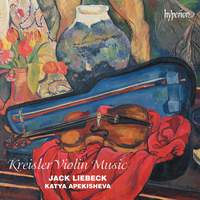Recording of the Week,
Jack Liebeck plays violin music by Kreisler
The Austrian-born violinist Fritz Kreisler (1875-1962) must be one of the finest musical hoaxers in history. His meteoric solo career was marked not just by the flamboyance of his playing, but by the historical curiosities which he programmed in recital: virtuosic baroque show-stoppers by unsung geniuses like ‘Gaetano Pugnani’ and delightfully sugary Viennese encores apparently penned by early nineteenth-century masters of the waltz enchanted and intrigued audiences, and won Kreisler acclaim for his romantic tales of discovering entire libraries of neglected manuscripts in isolated European monasteries.

It was only in 1935, in a telegram interview for his sixtieth birthday, that Kreisler confessed all to the New York Times: the pieces had in fact been his own work all along, a revelation which provoked outrage and amused admiration in roughly equal measure!
It’s difficult not to suspect that there was an element of good-natured mischief-making at work, but Kreisler’s musical joke seems to have been born at least partially out of modesty: after eventually coming clean about the situation he opined that he felt it would have been ‘impudent and tactless’ to plaster his name all over concert-programmes, particularly in his early career.
Initially I had my doubts about whether an entire disc of his showpieces and encores might create the aural equivalent of sugar-rush, but I was pleasantly surprised by how much stylistic variety there is here. This is due in part to clever programming (the Viennese bonbons are interspersed with the faux-baroque pieces and transcriptions of Romantic works), in part to Kreisler’s magpie-like ability to borrow from different genres and in part to the young British violinist Jack Liebeck’s own responsiveness to these shifts in style.
In his lifetime, Kreisler was at least as well known for his expansive, then rather idiosyncratic performance style as he was for his musical ‘discoveries’ (his pronounced vibrato cost him an orchestral job in Vienna when he was first starting out); his playing had a profound influence on subsequent generations of players but can – dare I say it? – seem a little mannered or indulgent to modern ears.
It’s interesting to see which of Kreisler’s stylistic trademarks Liebeck embraces and which he uses more sparingly. The first thing which grabbed my attention was the fluidity of the Praeludium and Allegro (perhaps Kreisler’s best-known work, originally passed off as the work of Pugnani) which in lesser hands can sound like a technically impressive but rather four-square etude. Liebeck is deliciously liberal with the rubato here, pulling around the tempo and teasing out the underlying melodies with panache: this rhythmic licence is very much a feature of the disc, and entirely in keeping with The Master’s own playing style.
Liebeck is rather more reserved when it comes to the portamenti (slides and ‘swoops’ between notes) which became such a hallmark of Kreisler’s own playing – his account of the famous Liebesleid is far ‘cleaner’-sounding in this respect than Kreisler’s recording of the piece, though little touches in the articulation pay homage to the composer’s interpretation. His vibrato, too, is far less extravagant than Kreisler’s own, though the way he varies it from piece to piece and phrase to phrase again shows the influence of the original recordings.
An hour in the company of Messrs. Liebeck and Kreisler is very definitely time well spent, and it struck me as I listened that in a sense the relationship between Liebeck’s playing and Kreisler’s interpretations is a nice reflection of that between Kreisler and his ‘Old Masters’: underpinned by an obvious affection and understanding of the earlier style, yet always infused with freshness and individuality.
Jack Liebeck (violin) & Katya Apekisheva (piano)
Available Formats: CD, MP3, FLAC, Hi-Res FLAC



